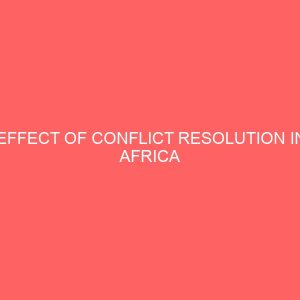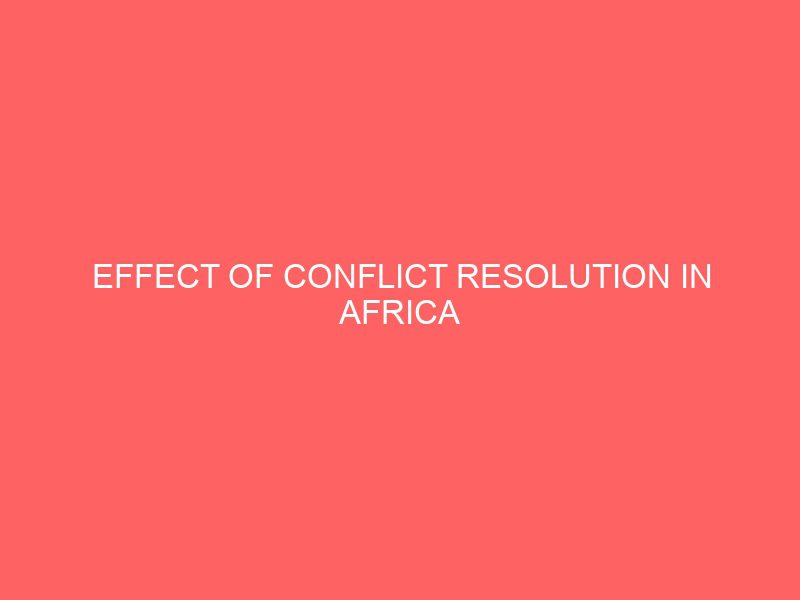Description
CHAPTER ONE
INTRODUCTION
1.1 Background of The Study
This research is on Effect of conflict resolution in Africa. The dramatic changes in the international system which begun in the latter half of the 1980s led to the belief that a new age of peace, a new world order had dawned. With the collapse of the Soviet Union and a united Germany, ideological and military bipolarity yielded seemingly to a new era where Western political and economic ideologies stood without much challenge. The cold war is over; many hailed the victory of Western democracy and Francis Fukuyama declared the “end of history” (Marvin, 2004). Indeed, a different era, what has been described as a “new world order” has been established. This era is different from the Cold War era of the preceding 40 years. A period marked by nuclear disarmaments and subtle Cold War strategies have been followed by one rendered even unstable by crisis and regional conflicts all over the world.
For Africa, the story of the past four decades reads like the litany of the apocalypse as the region continues to be devastated by conflicts and the wide spread destruction of life, limb and property. The names of many African countries continue to evoke images of horror, elemental suffering, destruction and death: Democratic Republic of Congo (formerly Zaire), Angola, Mozambique, Sudan, Ethiopia, Uganda, Chad, Burundi, Somalia, Liberia, and Sierra Leone As one locus of horror begins to recede in memory, another locus, even more horrifying, thrust itself onto the scene. Think about the Rwandan conflict. The third worse genocide of the 20th century (first being that of the Armenians by the Young Turks in 1915 and second that of the Jews and Gypsies by the Nazis from 1938 to 1944 (Destexhe, 1995). The genocide in Rwanda had been the worst in modern history where in a matter of days another ethnic group decimated a whole population. Philip Gourevitch (cited in Hauss 2001) gave a graphic picture of the holocaust in Rwanda in the following words:
Decimation means the killing of every tenth person in a population and in the spring and early summer of 1994 a program of massacre decimated the Republic of Rwanda. Although the killing was low-tech-performed largely by the use of machete, from a population of about seven and a half million, at least eight hundred thousand were killed in just a hundred days. Rwandans often speak of million deaths and they might be right. The dead of Rwanda accumulated at nearly three times the rate of Jewish dead during the Holocaust. It was the most efficient mass killing since the atomic bombings of Hiroshima and Nagasaki.
During the decades of the 1980´s alone, it is estimated that conflicts and violence claimed over 3 million lives with 160 million Africans living in the throes of war (Amoo, 1997). The figure of 3 million deaths could well be over 4 million if the Rwandan genocide of 1994 is factored in, and the wars of Burundi and Liberia are also included. Since the 1960, full- fledged civil wars have been fought in Africa; and eleven genocides and politicizes occurred in Africa between 1960 and the late 1980´s, compared with twenty-four elsewhere in the world. At the beginning of 1990, Africans accounted for 43 percent of the global population of refugees, most of them fleeing from political violence, and many dying from famine and exposure to diseases. The majority of these were women and children. According to the United Nations Children and Educational Fund (UNICEF), between 1980 and 1988, 850, 000 children who would otherwise have lived died as a result of only two of Africa’s wars, in Angola and Mozambique, (Amoo, 1997).
Predictions on the global conflict situation continue to be very gloomy. (Lund, 1999) in Preventing Violent Conflict: A Strategy for Diplomacy noted that: “In the years ahead crisis and threats will grow more numerous, not less, and will pose significant threats to international peace and security and to the interest of nations”. The journalist, (Robert, 1994) also warned of a “coming anarchy” in which the combination of crime, poverty, environmental decay and war will make our world a far more volatile and violent place to live. (Samuel, 1993) predicts the end of history, the return of traditional rivalries between nation states, and the decline of the nation state from the conflicting pulls of tribalism and globalism, among others. What does this hold for Africa?
The world has transformed rapidly in the decade since the end of the Cold War. An old system is gone and, although it is easy to identify what has changed, it is not yet clear that a new system has taken its place. Old patterns have come unstuck, and if new patterns are emerging, it is still too soon to define them clearly. The list of potentially epoch-making changes is familiar by now: the end of an era of bipolarity, a new wave of democratization, increasing globalization of information and economic power, more frequent efforts at international coordination of security policy, a rash of sometimes-violent expressions of claims to rights based on cultural identity, and a redefinition of sovereignty that imposes on states new responsibilities to their citizens and the world community.
These transformations are changing much in the world, including, it seems, the shape of organized violence and the ways in which governments and others try to set its limits. One indication of change is the noteworthy decrease in the frequency and death toll of international wars in the 1990s. Subnational ethnic and religious conflicts, however, have been so intense that the first post-Cold War decade was marked by enough deadly lower-intensity conflicts to make it the bloodiest since the advent of nuclear weapons (Wallensteen et al., 1996). It is still too soon to tell whether this shift in the most lethal type of warfare is a lasting change: the continued presence of contested borders between militarily potent states in Korea, Kashmir, Taiwan, and the Middle East, gives reason to postpone judgment. It seems likely, though, that efforts to prevent outbreaks in such hot spots will take different forms in the changed international situation.
A potentially revolutionary change in world politics has been a de facto redefinition of “international conflict.” International conflict still includes the old-fashioned war, a violent confrontation between nation states acting through their own armed forces or proxies with at least one state fighting outside its borders. But now some conflicts are treated as threats to international peace and security even if two states are not fighting. Particularly when internal conflicts involve violations of universal norms such as self-determination, human rights, or democratic governance, concerted international actions including the threat or use of force are being taken to prevent, conclude, or resolve them just as they sometimes have been for old-fashioned wars. In this sense some conflicts within a country’s borders are being treated as international.
There are various prominent recent examples. They include the delayed international military responses to genocide in Rwanda, ethnic cleansing in Bosnia, and repression in East Timor; the unprecedented military response of NATO to repression in Kosovo; the establishment and enforcement of no-fly zones in Iraq; and the use of economic sanctions against South Africa and Yugoslavia. Threatened or enacted coups d’état against democratically established governments have also sometimes been treated as international conflicts, as in Haiti. Similarly, threats of the violent dissolution of states or of their dissolution into violence have triggered international concern, as in Bosnia, Albania, and Somalia.
How important are such recent developments? In particular, do they make any important difference in how the actors on the world scene should deal with international conflicts? Do the tools developed for managing international conflicts under the old world system still apply? Are they best applied in new ways or by new entities? Are there new tools that are more appropriate for the new conditions? How do the old and new tools relate to each other?
The term conflict resolution broadly is used to refer to efforts to prevent or mitigate violence resulting from intergroup or interstate conflict, as well as efforts to reduce the underlying disagreements. We presume that conflict between social groups is an inevitably recurring fact of life and that the goal of conflict resolution is to keep conflicts channeled within a set of agreed norms that foster peaceful discussion of differences, proscribe violence as a means of settling disputes, and establish rules for the limited kinds of violence that are condoned (e.g., as punishment for violations of codes of criminal conduct).
The new world conditions are validating some past conflict resolution practices that can now be more precisely defined and conceptualized and are bringing to prominence some techniques that had not been taken very seriously by diplomatic practitioners in the recent past. We consider the implications of these new developments for the practice of conflict resolution. What knowledge base can conflict resolution practitioners rely on in a world in which their accumulated experience may no longer fully apply? What can the careful examination of historical experience and other sources of insight offer them?
This research identifies the effects of conflict resolution management and resolution in Africa, based on examination of empirical evidences which show limitations of the past efforts and thereby forms generalizations.
1.2 Statement of the problem
Despite the sustainable conflict resolution techniques incorporated towards resolving and managing conflicts in Africa, it is saddening that the problem still persists, a great number of Africans: young, old, male, female, civilians and military men alike, have lost their lives to various wars and conflicts on the continent. For instance, in the 1994 genocide in Rwanda, (Global coalition 2004:7) about 800,000 Rwandans was reportedly massacred. Similarly, the Burundi civil war claimed over 200,000 lives as at the year 2000, In Liberia, over 250, 000 lives were lost in the country’s fourteen year civil war between 1990 and 2004. This however, compelled this research work to measure the level of the effects of those conflicts resolution and management techniques in African.
1.3 Aim and Objectives of the Study
The aim of this study is to understand the effect of conflict resolution in Africa.
The specific objectives are;
- To investigate the causes of conflicts in countries domiciled in Africa.
- To examine the aftermaths of those conflicts on the vulnerable countries in Africa.
- To assess if incessant conflicts affect the national development of vulnerable countries.
- To examine the techniques employed in the resolution of conflicts in Africa.
- To assess the effectiveness of those techniques.
1.4 Research Questions
The following research questions were used for the study;
- Can persistent conflict be a major cause of under-development in Africa?
- Can corruption be a major cause of conflicts in Africa?
- Can bad governance lead to persistent conflicts in Africa ?
- Can economic hardship bring about conflicts in Africa?
- Has boundary disputes being leading to conflicts in Africa?
1.5 Research Hypotheses
From the above-mentioned research questions, some hypotheses shall be tested in this study. They are as follows:
H0: Persistent conflicts cannot be a major cause of under-development in Africa.
H1: Persistent conflicts can be a major cause of under-development in Africa.
H0: Corruption cannot be a major cause of conflicts in Africa.
H1: corruption can be a major cause of conflicts in Africa.
H0: Bad governance cannot lead to persistent conflicts in Africa.
H1: bad governance lead to persistent conflicts in Africa.
1.6 Significance of Study
The major significance is to deeply understand the effect of resolutions in African conflicts.
The study on Africa would contribute in no small measure as it will emphasize key techniques which have helped in conflict resolution and management.
Therefore, it should be noted that the management and resolution of conflicts need to be thoroughly and adequately appraised. This research would be useful to other researchers, who intend to further look at topics that relates to African conflicts and resolution.
1.7 Scope of the Study
The study of the effect of conflict management and resolution is delimited to the countries in Africa where over time, several strategies have been put in place to manage conflicts.
1.8 Limitations of the Study
- Access to educational research resources.
- Network interconnectivity to enhance elaborate research.
- Time and cost constraints
1.9 Definition of Terms according to Oxford Learners Dictionary;
Conflict: A serious disagreement or argument, typically a protracted one
Resolution: The action of solving a problem or contentious matter
Africa: The second largest continent, a southward projection of the Old World land mass divided roughly in two by the equator and surrounded by sea except where the Isthmus of Suez joins it to Asia.
Mediation: Intervention in a dispute in order to resolve it; arbitration.








Reviews
There are no reviews yet.